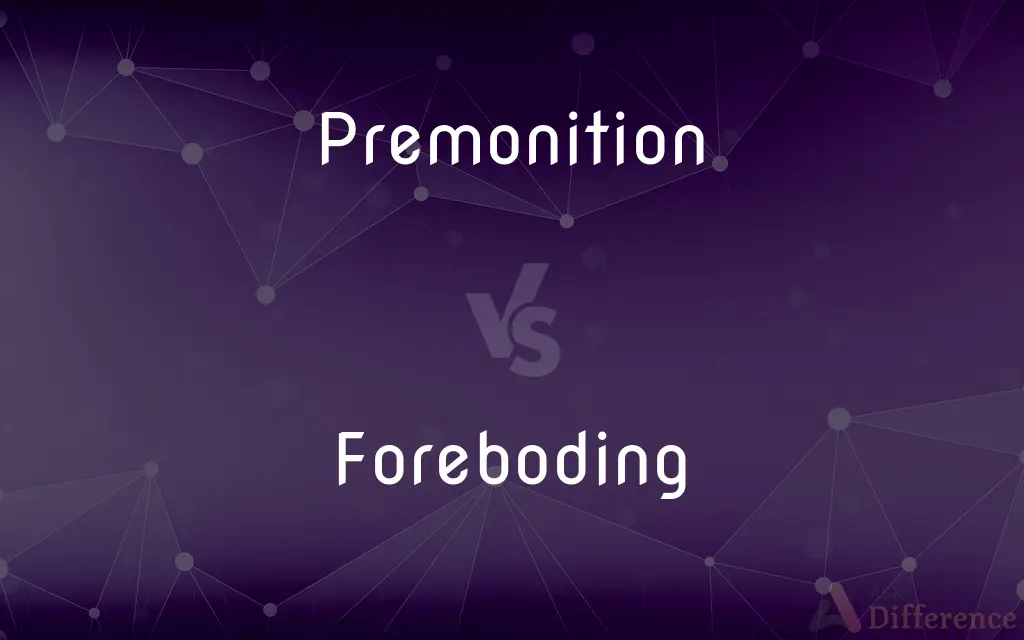Premonition vs. Foreboding — What's the Difference?
By Tayyaba Rehman — Published on October 20, 2023
Premonition is a feeling or intuition of a future event, while foreboding is a strong inner feeling of future misfortune or evil.

Difference Between Premonition and Foreboding
Table of Contents
ADVERTISEMENT
Key Differences
Premonition and foreboding are terms often used interchangeably to describe feelings about future events. However, they differ in both origin and specificity. Premonition typically refers to a specific intuition or sensation about a future occurrence, often without any concrete basis. On the other hand, foreboding is a more generalized feeling of impending doom or misfortune, without the clarity of what might specifically occur.
Diving deeper into the word premonition, it often has neutral or even positive connotations. While many might associate it with a bad feeling about the future, a premonition can also be a positive anticipation or expectation of future events. Conversely, foreboding is almost exclusively negative, conveying a sense of dread or apprehension about what lies ahead.
Another distinction between premonition and foreboding is their degree of certainty. A premonition is an inkling or intuition that something will happen. It's a subtle inner voice or gut feeling. Foreboding, however, is more intense. It's a strong inner conviction or sensation, almost an undeniable knowledge that something adverse is on the horizon.
Lastly, when considering the origins of these feelings, a premonition might arise seemingly out of nowhere, like a fleeting thought or dream. Foreboding, on the other hand, often emerges from our observations, experiences, or external cues that indicate potential danger or negativity ahead.
Comparison Chart
Basic Definition
Intuition or sensation of a future event
Strong inner feeling of future misfortune
ADVERTISEMENT
Connotation
Can be neutral or positive
Typically negative
Degree of Certainty
An inkling or intuition
Strong inner conviction or sensation
Specificity
May or may not be specific about the event
General sense of impending doom
Origins
Can arise spontaneously, like from a dream
Often emerges from external cues or observations
Compare with Definitions
Premonition
A feeling or anticipation about a specific future event.
A sudden premonition warned him to be cautious on his journey.
Foreboding
An ominous prediction or presentiment of upcoming evil.
Dark clouds gave a foreboding of the approaching storm.
Premonition
An inexplicable awareness of what is yet to come.
Jane's premonition about the storm proved accurate.
Foreboding
A prediction or sign indicating trouble.
The owl's cry was seen as a foreboding by the villagers.
Premonition
A sensation about the future without concrete evidence.
Her premonition about the surprise party turned out to be right.
Foreboding
A feeling of anxiety about future developments.
The quietness of the night filled him with foreboding.
Premonition
An intuition of a future occurrence.
Lisa had a premonition that she would receive a promotion.
Foreboding
A strong inner feeling of impending misfortune.
A sense of foreboding overcame her as she entered the abandoned house.
Premonition
A forewarning or advance notice based on instinct.
Before the phone rang, he had a premonition of who it might be.
Foreboding
A sense of impending evil or misfortune.
Premonition
A presentiment of the future; a foreboding
I had a premonition that our risky endeavor would end badly.
Foreboding
An evil omen; a portent.
Premonition
A warning in advance; a forewarning
That skirmish was a premonition of battles to come.
Foreboding
Ominous.
Premonition
A clairvoyant or clairaudient experience, such as a dream, which resonates with some event in the future.
Foreboding
A sense of evil to come.
Premonition
A strong intuition that something is about to happen (usually something negative, but not exclusively).
Foreboding
An evil omen.
Premonition
Previous warning, notice, or information; forewarning; as, a premonition of danger.
Foreboding
Of ominous significance; serving as an ill omen; foretelling of harm or difficulty.
Premonition
A feeling of evil to come;
A steadily escalating sense of foreboding
The lawyer had a presentiment that the judge would dismiss the case
Foreboding
Present participle of forebode
Premonition
An early warning about a future event
Foreboding
Presage of coming ill; expectation of misfortune.
Foreboding
A feeling of evil to come;
A steadily escalating sense of foreboding
The lawyer had a presentiment that the judge would dismiss the case
Foreboding
An unfavorable omen
Foreboding
Of ominous significance
Foreboding
A sense of impending doom or apprehension.
The sudden temperature drop gave everyone a foreboding of what was to come.
Common Curiosities
Is premonition always negative?
No, a premonition can be neutral or even positive, indicating any future event.
Can a premonition be based on evidence?
Typically, a premonition arises from intuition without concrete evidence.
What's the main sentiment behind foreboding?
Foreboding conveys a sense of dread or apprehension about the future.
How can you differentiate between a premonition and a random thought?
A premonition often has a strong intuitive feeling about a specific future event, whereas random thoughts may not.
Can you ignore a premonition?
While possible to ignore, many people heed premonitions as warnings or guidance.
How strong is the feeling of foreboding?
Foreboding is often a strong and intense feeling of impending misfortune.
Is it common to experience foreboding?
Many people experience forebodings occasionally, especially in situations perceived as threatening.
Can dreams be considered premonitions?
Dreams might be viewed as premonitions if they give insight into future events.
Is foreboding based on intuition?
Foreboding can be based on intuition or external cues signaling potential danger.
Are forebodings always accurate?
No, forebodings are feelings and may not always predict actual outcomes.
Can external events trigger a foreboding?
Yes, observations or external cues often lead to feelings of foreboding.
Can someone train themselves to have premonitions?
While intuition can be honed, deliberately inducing genuine premonitions isn't proven.
Share Your Discovery

Previous Comparison
Notes Payable vs. Notes Receivable
Next Comparison
Ronny vs. RonnieAuthor Spotlight
Written by
Tayyaba RehmanTayyaba Rehman is a distinguished writer, currently serving as a primary contributor to askdifference.com. As a researcher in semantics and etymology, Tayyaba's passion for the complexity of languages and their distinctions has found a perfect home on the platform. Tayyaba delves into the intricacies of language, distinguishing between commonly confused words and phrases, thereby providing clarity for readers worldwide.














































